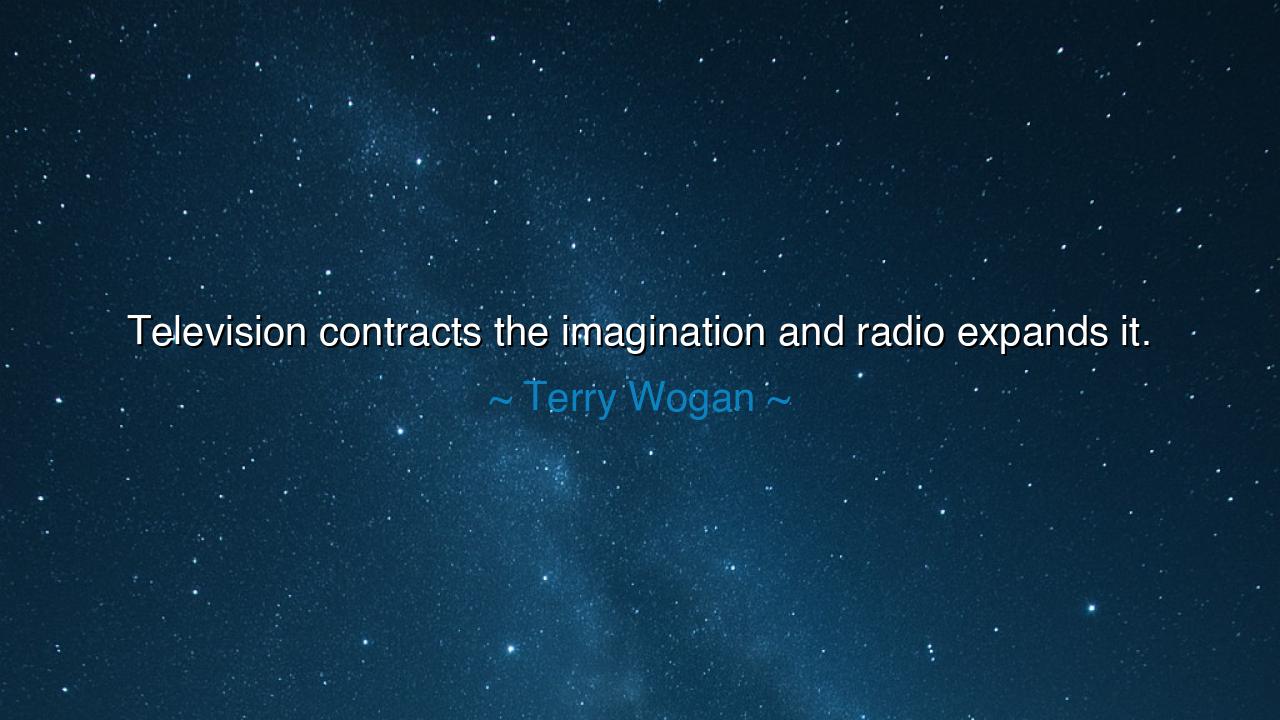
Television contracts the imagination and radio expands it.






“Television contracts the imagination and radio expands it.” So spoke Terry Wogan, a man whose voice carried warmth and wit across the airwaves of a thousand homes. His words hold within them an eternal truth — one that speaks not merely of technology, but of the very nature of the human spirit. For the eye is easily filled, but the mind must be awakened. When television places the picture before us, the journey of creation ends. But when radio whispers only the sound, the soul must rise to paint its own universe.
In the golden age of radio, when images were not yet bound in flickering light, people sat by their sets as if by sacred fires. Each voice that spoke was a spark; each story, a flame that leapt into unseen worlds. Through mere sound, listeners imagined faces, places, and dreams beyond measure. Radio did not give them the world — it invited them to make it. Thus, radio expands the imagination, for it leaves space for the listener’s mind to roam the boundless fields of creation.
Then came the television, bright and alluring, bearing color and motion. It conquered the household as swiftly as empires once conquered lands. Yet in its gift of vision, it also brought a quiet captivity. The eyes became prisoners of what they saw. The imagination, once a vast horizon, began to contract, bound by the shape and color dictated by another’s hand. The screen told us not only what to see, but how to feel — and the mind, relieved of its sacred duty to envision, grew still and small.
Consider, dear listener, the story of Helen Keller, who could neither see nor hear, yet whose imagination soared beyond all sight. Deprived of the images that others took for granted, she built her world from the touch of air, the warmth of sunlight, and the rhythm of a friend’s fingers upon her palm. She lived as if the radio of her soul played forever — unseen, unshown, but deeply known. From within darkness and silence, she expanded the realm of imagination far beyond those who could see every color and hear every song.
The wisdom of Wogan’s words is not an attack upon invention but a reminder of balance. Every image seen too easily risks dulling the inner eye. The ancients, who gathered around storytellers under the stars, knew this truth well. They had no screens to guide them, yet the tales of their elders grew into myths that shaped civilizations. They saw with their hearts and heard with their spirits — and so their stories live forever, while many shows fade as swiftly as their final frame.
So let us not abandon the imagination to the glowing screen. Let us listen again — to words, to silence, to one another. Turn off the image now and then; let the mind’s eye awaken once more. Read aloud. Listen to music with eyes closed. Describe the world to someone without showing it. For every moment we choose to imagine instead of merely observe, we reclaim our ancient power as creators of worlds unseen.
Thus, the lesson endures: What is shown can entertain, but what is imagined can transform. Guard your imagination, for it is the workshop of your destiny. Let the voice of radio within your soul expand the universe of your mind — vast, radiant, and ever your own.






AAdministratorAdministrator
Welcome, honored guests. Please leave a comment, we will respond soon